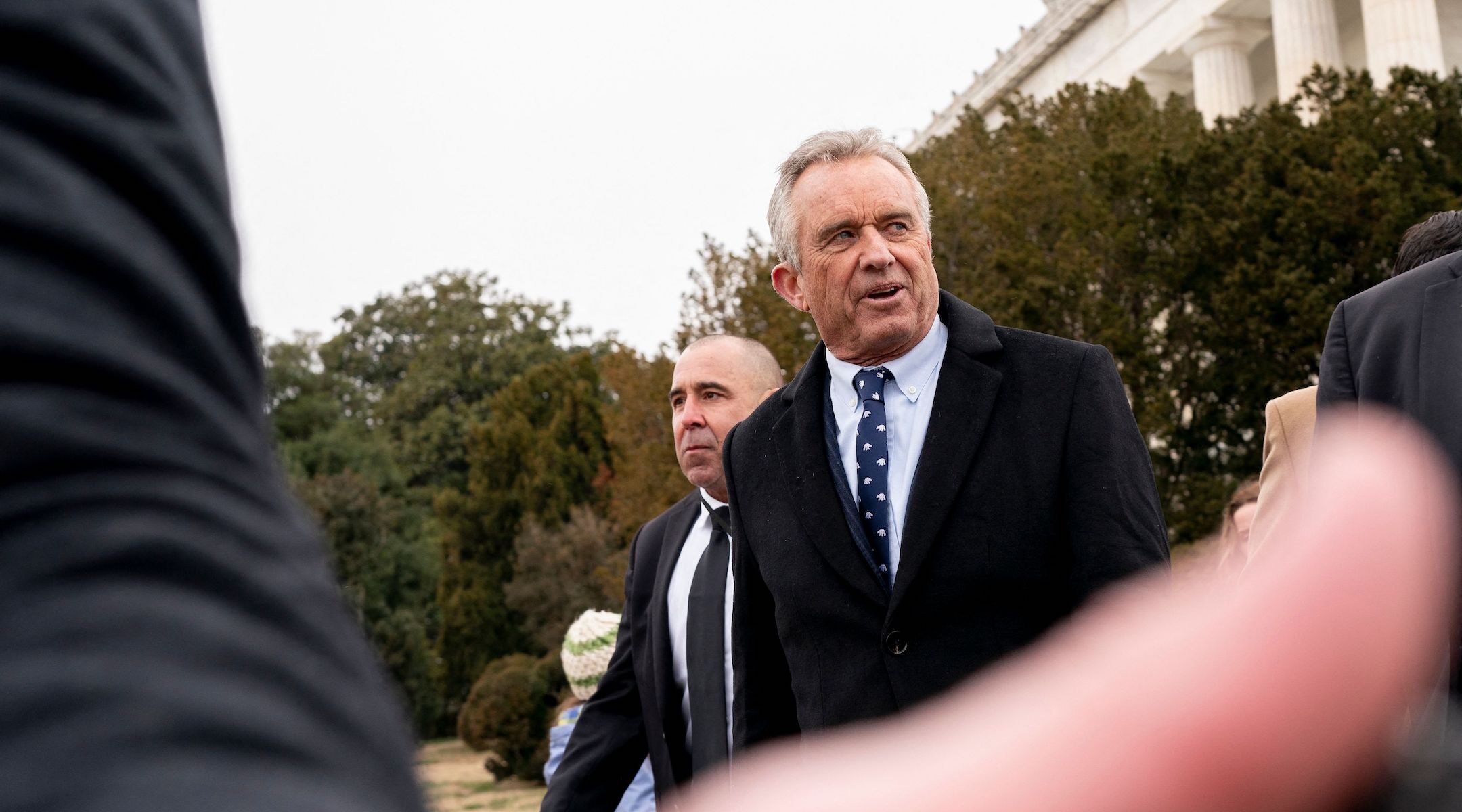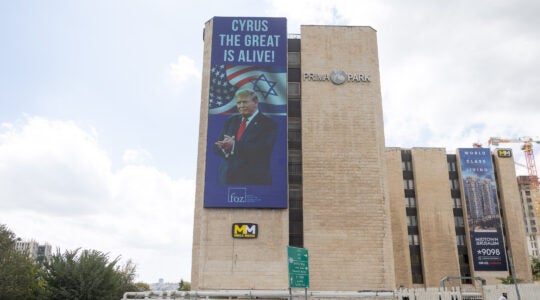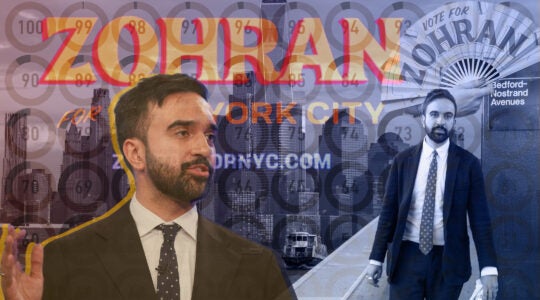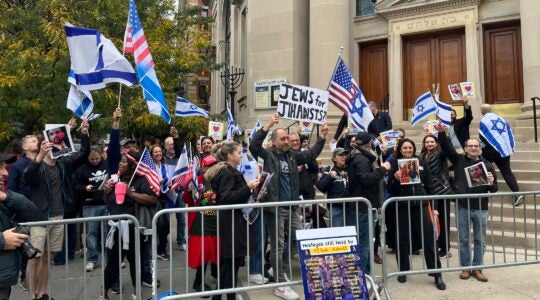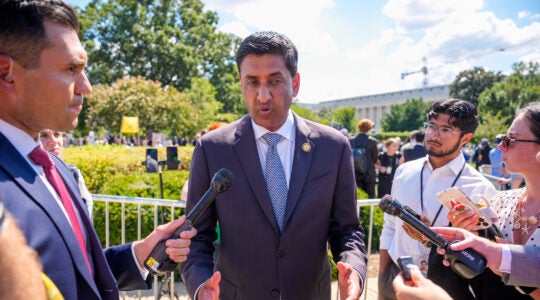Independent presidential candidate Robert F. Kennedy Jr., who injected outlandish comments about Jews into the national dialogue and also vocally supported Israel, suspended his campaign Friday and said he would support Donald Trump.
Kennedy, who had previously run in the Democratic party and had gained attention in recent years as an anti-vaccine activist, dropped his bid Friday during an extended press conference in Phoenix, shortly before a scheduled Trump rally nearby.
Kennedy’s long-shot campaign was defined by eye-popping personal revelations, such as that his brain had been infested by a worm and that he had once dumped a dead bear cub in Central Park. But he also trafficked in a range of conspiracy theories: Many were related to vaccines, and some involved Jews, including the claim that the COVID-19 pandemic had been “ethnically targeted” to avoid Ashkenazi Jews. Throughout, he furiously denied any charges of antisemitism, including during a Congressional hearing.
At the same time, Kennedy was a vocal defender of Israel, calling its war in Gaza “a moral war” and stating, “Self-defense means destroying Hamas.” He has also harshly criticized Palestinians in demeaning terms, referring to them as “arguably the most pampered people by international aid organizations.”
Kennedy is married to “Curb Your Enthusiasm” actress Cheryl Hines; the two were introduced to each other by her Jewish co-star Larry David.
While Kennedy was polling in the single digits and he recently lost a legal battle to appear on the ballot in New York, the political outsider attracted enough potential backers from across the spectrum to potentially act as a spoiler in a razor-tight race between Trump and Democrat Kamala Harris. He withdrew from the ballot in Arizona, a key swing state, in advance of his decision.
He said that he withdrew because he did not want to act as a spoiler, though he also mused about the unlikely scenario that the Electoral College becomes deadlocked, somehow allowing him to achieve victory through a contingent election. He said he would remain on the ballot in safe red or blue states.
In backing Trump the day after Harris formally accepted her party’s nomination, Kennedy says he is choosing a candidate who aligns with his ideas on public health and the war in Ukraine as well as other issues. He said he was going to “throw my support to President Trump.”
“One of the two candidates has adopted these issues as his own, to the point where he has asked to enlist me in his administration. I’m speaking, of course, of Donald Trump,” Kennedy said. “I was surprised to discover that we are aligned on many key issues. In those meetings, he suggested that we join forces as a unity party.”
Kennedy’s habit of comparing U.S. vaccine policies to Nazi Germany predated his presidential bid and immediately caused trouble for him. During a 2022 anti-vaccine rally, he declared, “Even in Hitler’s Germany, you could cross the Alps into Switzerland, you could hide in the attic like Anne Frank did” — a remark he later apologized for. He also has a history of using the word “holocaust” to refer to vaccine policies.
He formally jumped into the race in April 2023, at first challenging President Joe Biden in the Democratic primary. But Kennedy was soon in hot water with the Jewish community again when he claimed on the campaign trail that “there is an argument” that COVID-19 was “ethnically targeted,” and that “the people who are most immune are Ashkenazic Jews and Chinese.”
Jewish community leaders were outraged — especially as Kennedy was soon scheduled to testify before Congress as a guest of House Republicans on the topic of digital censorship. The Anti-Defamation League denounced Kennedy, and two Jewish Democrats, Debbie Wasserman Schultz and Dan Goldman, led 100 of their colleagues in urging Republicans to disinvite him, stating, “Mr. Kennedy has repeatedly and recently spread vile and dangerous antisemitic and anti-Asian conspiracy theories that tarnish his credibility as a witness.”
Kennedy’s House appearance went forward anyway, and he used the opportunity to forcefully deny that he was antisemitic. Days later, he addressed the Jewish community directly after celebrity Rabbi Shmuley Boteach arranged an event for him in Manhattan.
“I’ve literally never said an antisemitic word in my life,” Kennedy said there, while repeating his contention that Sirhan Sirhan, the Palestinian convicted of assassinating his father in 1968 over the then-presidential candidate’s support for Israel, didn’t actually commit the crime. Three months later, Kennedy dropped out of the Democratic primary and launched his independent bid.
Even amid such statements, Kennedy enjoyed support from some vocally pro-Israel Jews. Morton Klein, head of the right-wing Zionist Organization of America, was an Israel advisor to the campaign. Bill Ackman, the activist investor who has waged a war against campus antisemitism at Harvard and other colleges, has also praised Kennedy’s strongly pro-Israel stance.
At least one rabbi remains in his corner: Michael Barclay, a conservative pundit and spiritual leader of Temple Ner Simcha in Westlake Village, California. The two became friendly during the COVID-19 pandemic and Barclay defended Kennedy from Schultz’s charges of antisemitism in 2023, saying the candidate’s Anne Frank comments were “an example of how during the Nazi regime it was still possible to hide in an attic like she did, but the technology of today’s governments prohibits that possibility.”
Kennedy, whom Trump has hinted could serve in his cabinet, would not be the first Trump ally to traffic in antisemitic conspiracy theories. The Republican has long associated with the rapper Ye, and recently continued to defend him during an interview with a Jewish livestreamer. Trump has sought to paint himself as the true defender of the Jewish people and has accused Harris of emboldening antisemitism, while Harris’ campaign has slammed Trump for deriding Jewish Democrats and said he “traffics in antisemitic tropes.”
Correction: An earlier version of this story stated that Rabbi Michael Barclay attended Kennedy’s concession speech in person. Barclay watched it on television but remains a Kennedy supporter and friend.
JTA has documented Jewish history in real-time for over a century. Keep our journalism strong by joining us in supporting independent, award-winning reporting.
